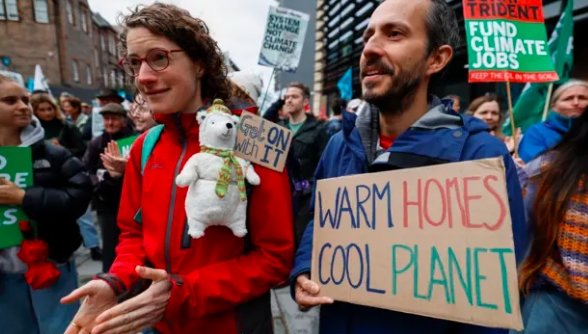The Scottish government announced new climate targets on October 8, 2025, aiming to accelerate progress toward net zero emissions by 2045. IPPR Scotland praised the move as a vital step forward, urging a shift from individual efforts to coordinated national programs.
Scotland’s Renewed Commitment to Climate Action
Scotland has long positioned itself as a leader in tackling climate change, with laws in place since 2009 to cut greenhouse gas emissions. The latest targets build on carbon budgets that outline five year limits from 2026 to 2045. These budgets align with advice from independent experts and reflect a 57 percent reduction from 1990 levels by the end of the decade.
This announcement comes at a pivotal time. Just a week earlier, global reports highlighted how renewable energy sources like wind and solar are starting to replace fossil fuels in power grids worldwide. In Scotland, renewables already make up over half of electricity generation, but challenges remain in areas like heating homes and transportation.
The government faces pressure after past misses on emissions goals. For instance, annual targets were not met nine times by 2022, and the original 75 percent cut by 2030 proved too ambitious, leading to adjustments earlier this year. Now, with these new budgets, officials promise more realistic yet ambitious pathways.

IPPR Scotland Welcomes the Targets with Key Warnings
IPPR Scotland, a leading think tank on public policy, quickly endorsed the government’s decision. Dave Hawkey, a senior research fellow there, called it a sign that Scotland remains committed despite years of policy delays. He noted the global shift to renewables as a timely backdrop for the news.
Hawkey emphasized that meeting net zero requires more than ambition. Parliament and the public must recognize the need for a team effort to speed up changes. Recent data shows Scotland’s emissions fell only slightly in 2023, stalling overall progress amid a warm winter that masked rising trends in heating and transport.
Experts point to successes in electricity decarbonization but stress gaps in daily life sectors. For example, food production and travel still contribute heavily to emissions, and without bold action, the 2045 goal could slip further.
Shifting from Individual Choices to Systemic Solutions
To succeed, Scotland must move beyond viewing climate action as personal choices. Hawkey advocated for organized programs that deliver solutions directly to people. This includes upgrading infrastructure, building new supply chains for green tech, and providing financial support where costs block progress.
Consider home heating, a major emissions source. Many households struggle with the upfront expense of switching to low carbon systems like heat pumps. Government grants exist, but experts say they need to expand to between 600 million and 1 billion pounds this decade to make a real difference.
Public involvement is crucial too. Polls show most Scots across parties support climate policies, even if they involve some costs. Yet, without clear plans, skepticism grows, as seen in recent debates over missed targets and scrapped bills like the one for building heat standards.
Here are some key areas for systemic change:
- Infrastructure Upgrades: Invest in electric vehicle charging networks and insulated buildings to cut transport and heating emissions.
- Supply Chain Development: Boost local manufacturing for renewables, creating jobs while reducing reliance on imports.
- Financial Assistance: Offer targeted grants and low interest loans to low income families for energy efficient upgrades.
- Education and Support: Run community programs to guide people on sustainable choices without overwhelming them.
Building on Strong Financial and Democratic Foundations
The upcoming climate change plan must rest on solid financial and democratic bases. Hawkey stressed the role of taxes to spread costs fairly, rather than burdening individuals alone. This approach could fund transitions equitably, drawing from successful models in other nations.
Democracy plays a big part too. Policies affecting everyday life, like changes to farming or travel, need input from those impacted. Stronger public roles in decision making would build trust and ensure plans work in practice.
Recent events underscore the urgency. The UK government’s push for 95 percent clean power by 2030 influences Scotland, as energy policies overlap. Meanwhile, the Climate Change Committee warns that without faster action on buildings and transport, net zero remains at risk.
To illustrate the new targets, here’s a table summarizing the proposed carbon budgets:
| Period | Target Reduction from 1990 Levels | Key Focus Areas |
|---|---|---|
| 2026-2030 | 57% | Renewables expansion, heat efficiency |
| 2031-2035 | 69% | Transport electrification, land use |
| 2036-2040 | 80% | Full decarbonization of industry |
| 2041-2045 | Net Zero | Residual emissions offset |
These budgets provide a roadmap, but delivery depends on consistent funding and cross party support.
Broader Impacts and the Path Ahead
Scotland’s targets tie into global efforts, where renewables now outpace fossil fuels in new grid capacity. Locally, this could mean more wind farms off the coast and solar in urban areas, boosting the economy with green jobs. However, challenges like fiscal pressures from UK wide issues loom large.
Tying in recent news, the Programme for Government in June 2025 highlighted climate as a core priority alongside poverty reduction. Yet, with emissions statistics showing stalls, action must match words. Independent watchdogs urge ministers to avoid past mistakes, like delaying sectoral plans.
For readers worried about climate impacts, these targets offer hope but also a call to engage. Staying informed helps push for better policies that protect communities from floods, heatwaves, and economic shifts.
Share your thoughts on Scotland’s climate plans in the comments below, and spread the word to help build momentum for a greener future.


















